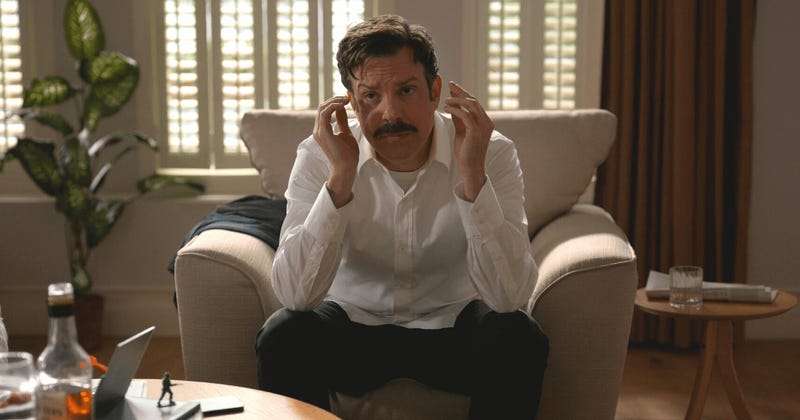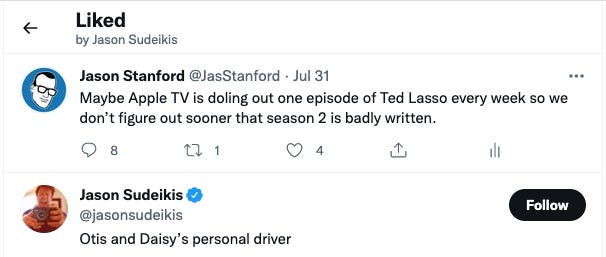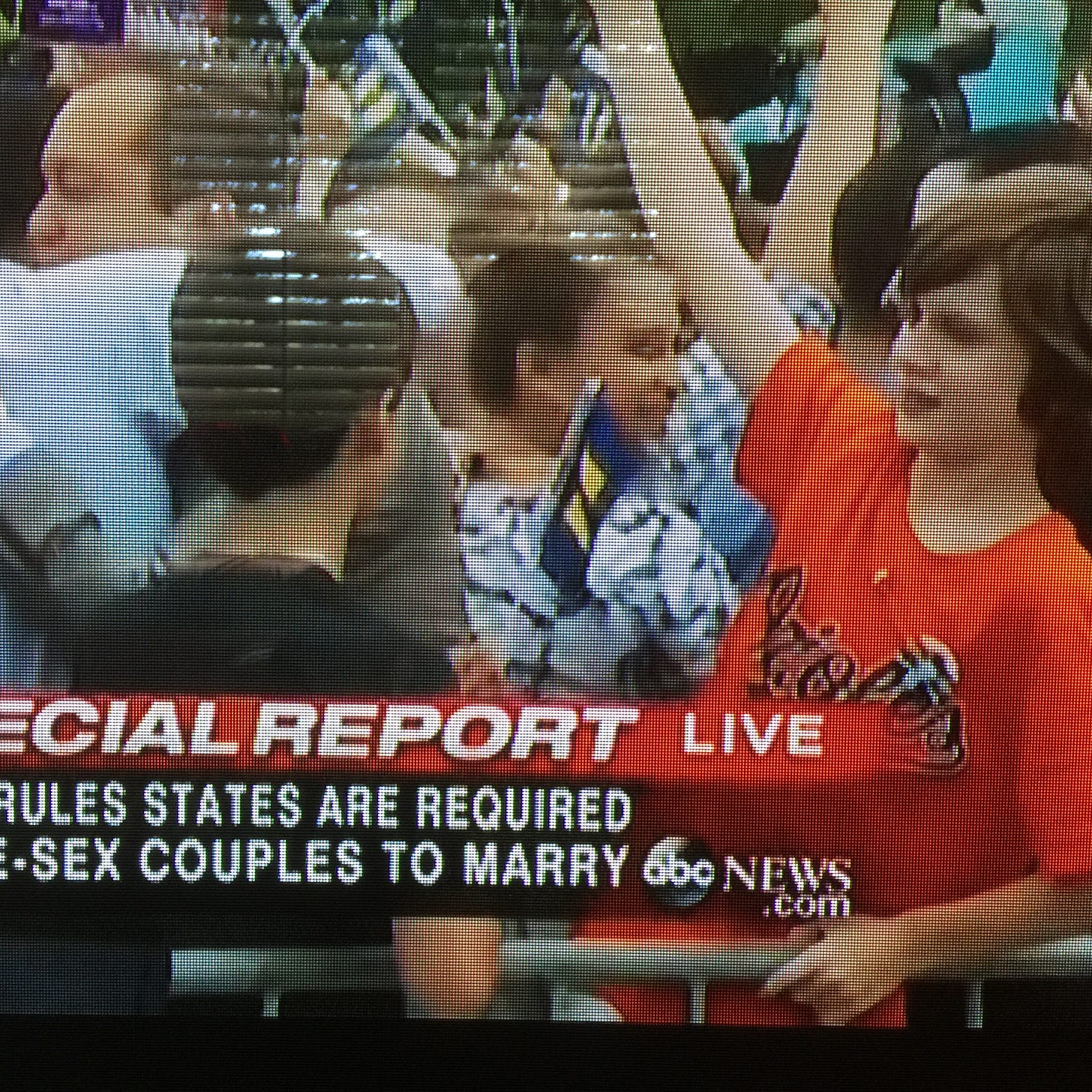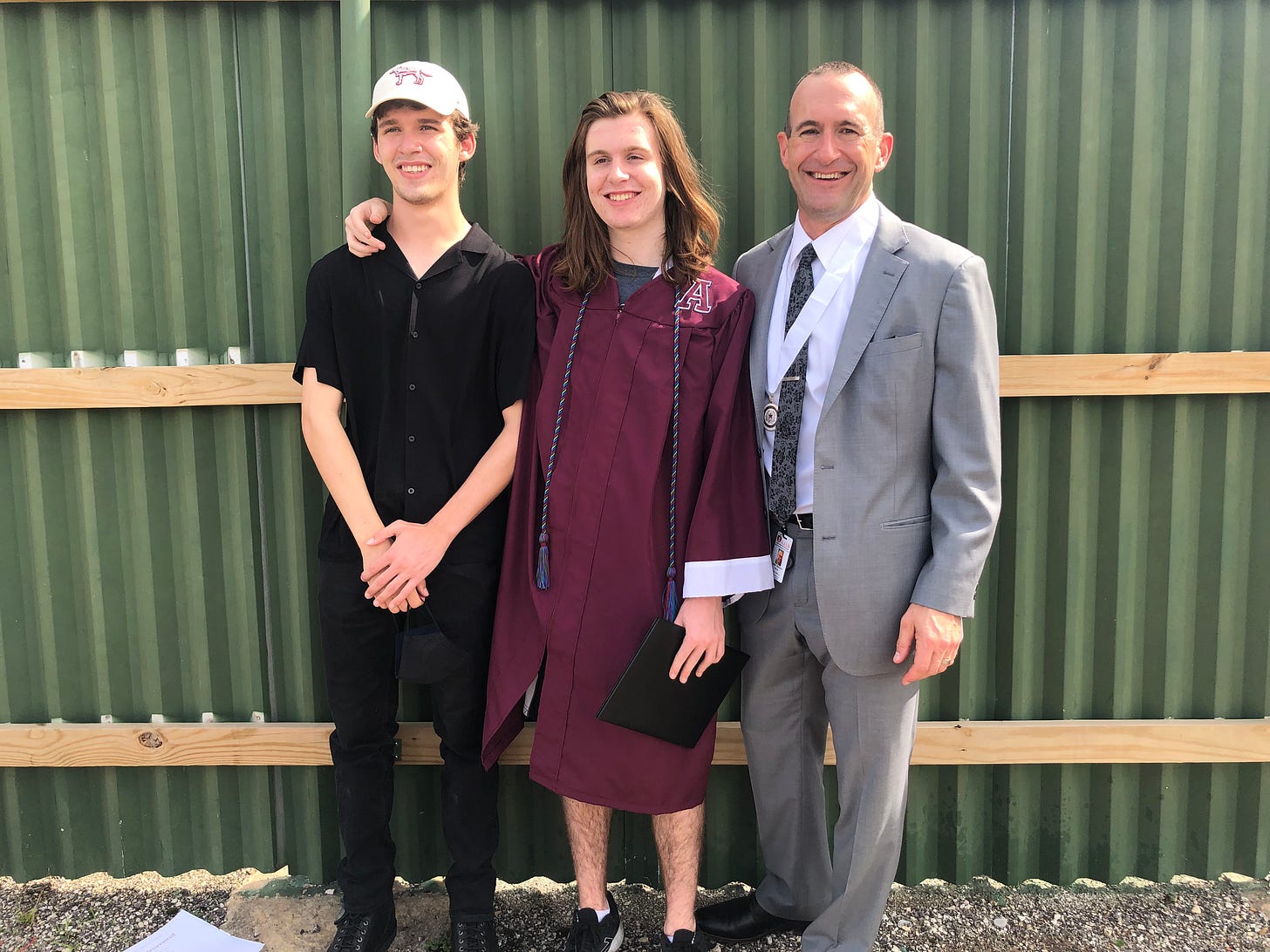The real reason Ted Lasso freaked out.
There's a horrible reason I noticed what the critics missed about the panic attack.
Welcome to The Experiment, where we have all the spoilers for Ted Lasso. If you’re not caught up on the second season, best if you put this aside until you do. And if you don’t want the end of the season spoiled by my can’t-miss prediction about the cliffhanger awaiting us at the end of season 2, best if you put this aside. But if you don’t watch Ted Lasso, looking at you, A.G., there’s still something here for you. This week the experiment is whether I can make Ted Lasso relatable to people who don’t watch the show.
Jack Hughes says John Roberts might have historical reasons to help progressives hustle Justice Breyer off the court in “The Breyer Patch.” And as always we offer recommendations on what to do (make Marcella Hazan’s tomato sauces), watch (bomb-ass Holland Taylor in The Morning Show S2), and listen to “While God Was Sleepin’…” by Kari Faux, after which I predict how all the storylines will end in Ted Lasso S2, but you’re going to have to scroll down to see that.
But first, I have a confession to make.
I didn’t like season 2 after loving the first season. I’m a sucker for white savior sports shows, Americans abroad shows, and shows that understand that being nice is radical hopepunk, not to mention Roy Kent swearing. Our home is a Ted Lasso stan household. We watched the first season, no joke, 11 times, and that might be an undercount. Better get the Cyber Ninjas to do an audit.
There was more anticipation than rejoicing at the debut of season 2. The broad humor—killing a dog with a penalty kick, really?—seemed off. Conflicts came and went within a single episode, never driving the story forward. And the therapist was played like an awkward joke. Once, she observed practice from the stands, and every time Ted turned around, she had moved to a closer seat, a seemingly pointless adoption of a psychological horror trope in a comedy show. After the warm bath of aggressive sincerity of the first season, the tone of season 2 seemed hacky.
The writers elevated the storylines of the supporting characters, forgetting the reason dieter of a show’s title: If the name of a character is the title of the show, the show is about that character. Barney Miller was about a character named Barney Miller. You might have tuned in to laugh at the antics of Jack and Karen, but the storylines of Will and Grace drove that show. But suddenly this fish-out-of-water show reduced the title character to a one-note joke about being uncomfortable with therapy, and I’m using the term joke more to describe its construct than any affect it had on the audience. I worried that the writers of Ted Lasso, so charming in courtship, had no talent for a successful relationship.
I tweeted the above, stating my opinion that season 2 was a badly written mess, whereupon the ship righted itself and the sails caught wind. I’m not saying my tweet necessarily caused season 2 to become replete with engaging storylines interspersed with charming bottle episodes, but we can’t rule it out. At the very least, I may have reversed jinxed the writers, or maybe they knew what they were doing all along, because Ted’s admittedly unfunny reaction to the therapist and the artificial way it was portrayed, so unlike season 1, made sense.
We were seeing her through the eyes of a man who had irrational fears about therapy and what it might uncover. This was about Ted Lasso all along. The audience wasn’t laughing because we were inside the head of a man whose psyche was on a low simmer.
The admission that he still had not gotten over his father’s suicide was given Big Reveal treatment, and his panic attack while getting dressed for the funeral of Rebecca’s father and subsequent therapy session supposedly explained All The Things: why he says “I appreciate you” like a mantra, why he is slow to anger, why he does not give up on people, even when they are Jamie Tartt.
As the other storylines cohered and gathered momentum… Wait. Sorry. I need to stop and second the point that Linda Holmes made in her recap of S2E10: The power dynamic in the Rebecca-Sam relationship is wildly out of balance and unfair to Sam. She owns the team he plays for, putting us awfully close to a wealthy, 50-something white British woman “owning” a 21-year-old African man. If you reverse the sexes and make the old, white, rich dude date the hot young woman, you have Rupert and his wife, except he went public with her, married her, and fathered her child. Sam and Rebecca have real chemistry and are wonderful characters, but Rebecca is out of line in toying with an employee’s heart, and the show seems uninterested in holding her to the standard it ridicules Rupert for actually meeting. I will take no further questions. Moving on.
Also, more on Rupert in a second. In any case, the Sam-Rebecca thing is headed for something, Nate’s evolution as an envious dickhead has to go somewhere, and now we have the return of the Keeley Jones-Roy Kent-Ted Lasso love triangle, which is so unwelcome, nonsensical, and obvious that it seems 100% contrived to set up a cliffhanger to make us throw up our hands and bemoan the necessary passage of time between the last seconds of S2 and the loud chord that accompanies the AppleTV+ logo that will play when S3 commences. The absolute bastards.
This is not a story about Ted and his father.
But after all the hugs and tears and dead dad stories in S2E10, the critics, mistaking so much emotional release for resolution, have reached a consensus: Ted dealing with his father’s suicide is what S2 is about. True, the fact that Ted’s empathy allows him to look past behavior in others to see the pain they are feeling explains much about his character, but it doesn’t explain what we’re all doing watching this show together. S2 cannot be about explaining why Ted Lasso says “I appreciate you” to everyone. We don’t watch a story to find out what what we already know. We watch this story to find out how the story ends, and this is not a story about Ted Lasso finally opening up to a therapist about his father’s suicide.
The writers are telling you this is what the story is about even though it’s seemingly been resolved. The therapist comes right out and says that he suffered a panic attack because he was getting ready for the funeral of Rebecca’s father, and the critics have dutifully adopted the party line, though one hilariously suggested it could have been caused by Ted’s listening to “Easy Lover” while trying to tie his necktie.
But our writers know misdirection, don’t they? The only soccer plays they’ve showed us are trick plays and the Jamie Tartt decoy play. Ted’s confession that he discovered his father’s suicide the same day Rebecca discovered her dad’s infidelity is a decoy. That those two things happened on the same date are intercut to weave an appearance of significance, but the death and traumatic memory only supplied the puddle of gasoline. It was not the match.
S2 is a story about Ted Lasso not dealing with the fact that he is angry that his dad “quit on his family.” Ted, who moved an ocean away from his own son, is angry at his father for quitting on his family. Remember, S2 implicates the audience in how Ted sees his world. Of course the show thinks he freaked out because he was getting dressed for a father’s funeral—especially when they let it drop that he didn’t go to his own father’s funeral. That’s how Ted sees it.
But there are different ways of seeing things. Our eyes alight upon objects, and those signals reach our brain even if we don’t think we see them. Sometimes our psyche has to freak the heck out to get us to notice what is right in front of our face, and that’s exactly what happened to Ted as he started to tie his tie. He stood in front of a mirror, which is a horrible place if there’s something you’d rather not face, and glanced down at the photographs on his bureau. There’s one with his colleagues from work decked out in Richmond trackies. And there’s another of his son.
This is not a story about Ted and his father. This is a story about Ted and his son.
This is a story about Ted and his son.
No sooner did Ted see the photograph than his psyche showed him a quick slide show: an image of a toy army man his son gave him, a memory of building a LEGO bus set with his son. And Bob’s your uncle, Ted’s placing an emergency call to his therapist. And even though she earned his trust by saying tea “tastes like a wet paper bag,” he still misdirected her to the story of his father’s suicide and away from what’s really twisting him up, which is that he has abandoned his son.
Up at the top when I said I had a confession to make, that bit about regretting the tweet after the second episode was a misdirection, kind of like the Tartt decoy play. This is my real confession: I should have figured the story was headed here in S1 because I did the same thing in 2014. Like Ted, I have a happy, joyous relationship with my sons (I’ve got two boys, now in college). Like Ted, I packed up and moved far, far away for a job that represented a career break for me. He left American football—and his son—to move to London to coach soccer. I left political consulting—and my sons—to move to Virginia to be Planned Parenthood’s strategist. The same, but different.
We made it work, just like Ted. We texted and called. Either I would fly there every month or we would meet somewhere. We had adventures. We visited a Civil War battlefield in Franklin, Tennessee that was the most unintentionally hilarious tour in our lives. We saw Eminem at ACL. In the summer, I gave them scavenger hunts and Metro tickets while I worked during the day. We met friends at the Supreme Court the day the decision on marriage equality was handed down and ended up on national television. We went to all the Smithsonians we could think of. We went to an art installation that was basically a bougie ball pit in the Building Museum. We went to Orioles games and ate what in retrospect seems like a surprising amount of chicken wings.
We had an amazing time every time. Because what had seemed like a limitless supply was now rationed into monthly visits or vacations, our appreciation of each other became intense.
But the partings became even more intense. Every time I would get ready to take them to the airport I would begin a losing effort to hold myself together. The boys would watch me cry in public as S stage-managed a serviceable parting. They never doubted I loved them, though they cannot have understood why I left in the first place.
At first I told myself it would get easier. S and I thought this was a permanent move, not a travel abroad situation for mid-career dads. This became the thing I’d say when I would tell the story about how hard it was. I remember once I trotted out this chestnut while watching a Georgetown basketball game with T.
“Do you really want it to get easier?” he asked.
I did not. I didn’t want to feel apart from my sons, yet I could not face the plain facts that I had separated myself from them, so every time we parted I could not hold it together. It was worse than crying out of deep sadness. I was being confronted with my own mirror and could not admit what I was seeing. My dad worried that I was having a nervous breakdown, which, because it was my dad, I thought was both ridiculous and insulting. I’m just sad because I love them and miss them, I told myself, keeping the real truth from myself until I was ready to face what I’d done.
Unlike Ted, I did not have a writers room to craft a satisfying narrative. Halfway through their summer visit, S realized that the boys and I needed to be together and started making plans to move back to Austin. I told myself we were moving back because my temporary gig ended at Planned Parenthood, still not wanting to sit in the confessional booth of the soul and admit what I’d done. Because to do that, I’d have to admit who I was. But still, lacking writers, the resolution was calm, nice, and mutually supportive.
Eventually I told the boys I knew I messed up, never should have left, and wanted to be with them, whereupon I commenced regular apologies for the next couple of years. They seemed fine. Not having had a vote in the matter, they accepted reality.
At some point I asked myself why I ever thought living so far from my sons would go well.
At some point I asked myself why I ever thought living so far from my sons would go well. The answer was obvious: Because my dad did. After they divorced when I was eight, my mom moved back home with us to Oregon, and my dad stayed in San Francisco before hopscotching over much of the next decade to DC, Baltimore, and Miami Beach. From the age of 8 till 16, I’d hear from him on Sundays and visit him in the summer. When I was in high school and living on the Olympic Peninsula in Washington state, he took a job with the Oregonian, he said, to be closer to us.
Unlike Ted, I never felt abandoned, angry, or alienated. It was just my reality. I had never examined this from his point of view or from mine as an adult. The idea of a father living much of the year without his children was a baked-in version of normal for me, so much so that at no point in replicating the exact same paradigm with my own sons did I ever notice the parallels. Brains are dumb things.
It took me a couple of years to forgive myself for this; Ted Lasso has two more episodes to land this storyline. I can’t tell you how it will end, but I’ve got a reasonable guess about this and a couple other storylines. If you want to read my predictions, they are below the “What I’m listening to.” If you would rather avoid even the possibility of spoilers, this is a good place to call it a day.
We all do these things, telling a story about our lives as misdirection, to protect us from the truth we’re not ready or willing to face. But the truth has a way of following you around, tugging on your shirtsleeves and banging into your shins until you stop what you’re doing and pay attention. Give yourself a break for not seeing what’s right in front of your face. Don’t worry. You’ll figure it out soon enough.
Jason Stanford is the co-author of NYT-best selling Forget the Alamo: The Rise and Fall of an American Myth. His bylines have appeared in the Washington Post, Time, and Texas Monthly, among others. Follow him on Twitter @JasStanford.
Más
How we’re getting through this
Watching the Emmys
Getting news from social media
Ordering frozen New Mexican chiles
Forgetting the Alamo with Rick Smith
Measuring myself against these 8 signs
Making tomato sauce with butter and onions
Looking forward to making more tomato sauces
What I’m watching
Not Cry Macho; what a disaster.
S2 of The Morning Show is coming out a week at a time. Big surprise of the second season for me is that Holland Taylor has another show to steal scenes on. For other actors, they call shows “vehicles.” For her, they are getaway cars.
I could have gone into this S2 scene in my essay, but then I would have gone off on a tangent about how Jamie professing his love to Keeley is so gallingly contrived. This scene felt real and was a S2 high point. Suffice it to say, this week we’re recommending Ted Lasso.
What I’m listening to
I don’t know a thing about Ada Lea except that this is a bracingly honest song about bad decisions.
I don’t know a thing about Solemn Brigham, either, except that no one else does, either, and yet here he is with a fully formed debut album. If you like the hip-hop, this will land.
Kari Faux is a Little Rock rapper known for her conversational style. Really dig this track, “While God Was Sleepin’…”
Anthony Hamilton is an old-school soul and r&b guy who updates the genre with “Love Is The New Black.”
Finally, Andy Shauf, whose previous two albums we’ve recommended here, comes in for a third time with Wilds.
My Ted Lasso predictions
In ascending order of certainty, here is what I think will happen at the end of S2:
Sam and Rebecca reunite and go public, at which point the press goes insane because, as no one has pointed out yet, she is his boss. The scandal divides the lockeroom.
Something something something Jamie Tartt something Roy something Keeley Jones. I will not care until Roy says the F word.
There will be a soccer game in the last episode. Given the lack of soccer in S2, this is a coin flip.
Ted figures his stuff out and leaves, probably mid-match, for the airport to do a rom-commy dash for a plane. This sets up one of the big cliffhangers for S3: Will Ted return?
Rupert made his wife give back her shares in the Richmond club because he is buying another team and he’s going to hire the increasingly bad-guy Nate to coach. This will be a last-reel reveal when Rebecca’s amid a Me Too-ish scandal, her best friend is romantically involved to some degree simultaneously with a star player and a coach, and her manager has left to reunite with his son.
All of this puts Roy in charge. He will have the last word of S2. It will be exactly what you think.
What do you think of today's email? I'd love to hear your thoughts, questions and feedback. I might even put ‘em in the newsletter if I don’t steal it outright.
Enjoying this newsletter? Forward to a friend! They can sign up here. Unless of course you were forwarded this email, in which case you should…
Thanks to Noom, I lost 40 pounds and have kept it off for more than a year. Click on the blue box to get 20% off. Seriously, this works. No, this isn’t an ad. Yes, I really lost all that weight with Noom.
We set up a merch table in the back where you can get T-shirts, coffee mugs, and even tote bags now. Show the world that you’re part of The Experiment.
We’ve also got a tip jar, and I promise to waste every cent you give me on having fun, because writing this newsletter for you is some








